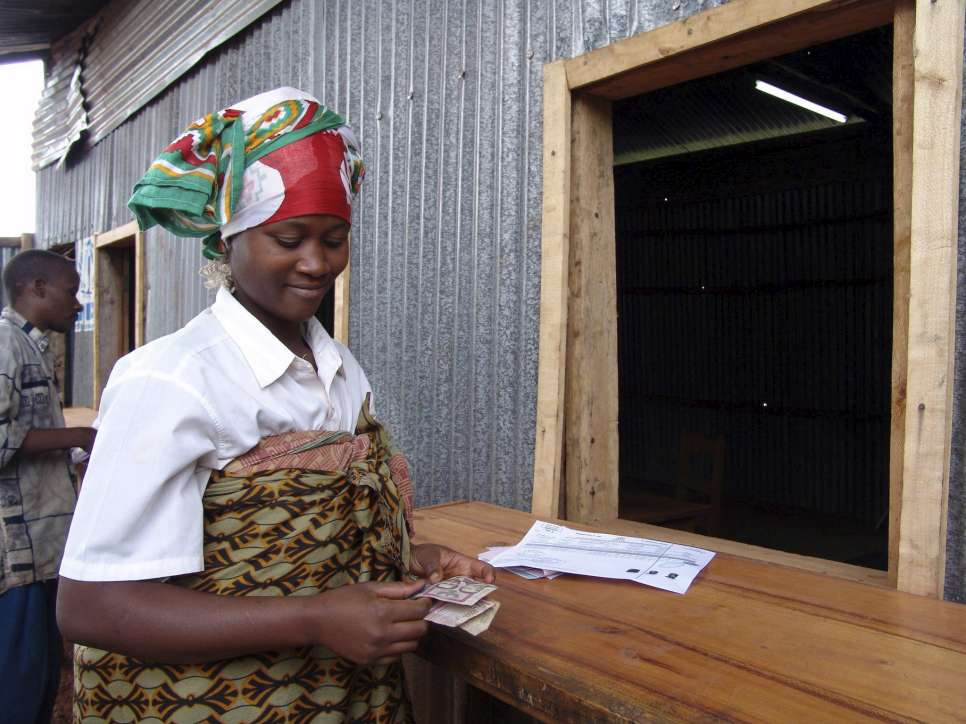Cash-Based Interventions
When people are forced to flee their homes, they leave with the bare essentials. They also lose their ability to earn and spend in the process. Our cash-based interventions (CBIs) seek to protect refugees by reducing the risks they face and to maintain their capacity to spend. CBIs can be used in a variety of settings, as long as there is a stable market and a safe way to provide refugees with cash or vouchers. The flexibility that CBIs offer makes them a more dignified form of assistance, giving refugees the ability to immediately prioritise and choose what they need.
Cash-based interventions make the displaced less likely to resort to harmful coping strategies, such as survival sex, child labour, family separation and forced marriage. They also directly benefit the local economy and can contribute to peaceful coexistence with host communities.
At UNHCR, we strive to make the best use of the latest available technologies, such as cash delivery through ATMs, iris scans and the EyeCloud in Jordan. We are also building ever-growing partnerships within the humanitarian community and the private sector.
Key documents
- 2016-2019 UNHCR Implementation of the Policy on Cash-Based Interventions
- UNHCR Fact Sheet on Cash-Based Assistance 2019
- Policy on Cash-Based Interventions
- UNHCR Strategy for the Institutionalisation of Cash-Based Interventions 2016-2020
- Basic Needs Approach in the Refugee Response
- Statement from the Principals of OCHA, UNHCR, WFP and UNICEF on Cash Assistance
Tools and guidance
Feasibility and Response Analysis
- Cash Feasibility and Response Analysis Toolkit
- UNHCR Multi-sector Market Assessment: Companion Guide and Toolkit (November 2020)
- Multi-sector Market Assessment Tools
- Rental Market Assessment Tools
- Overview of steps to establish a cash-based intervention
- Cash Delivery Mechanism Assessment Tool
Cash Assistance – Protection and Technical Sectors
- Review of environmental impact of Cash Based Interventions and in-kind assistance and Environmental Checklist
- The Role of Cash Assistance in Financing Access to Health Care in Refugee Settings and other Persons of Concern to UNHCR
- The use and calculation of cash grants in voluntary repatriation: Considerations to Assist UNHCR Colleagues
- Cash & Voucher Assistance and Gender-Based Violence Compendium: Practical Guidance for Humanitarian Practitioners
- Joint Guidance: Targeting of Assistance to Meet Basic Needs
- Cash-based Interventions Protection Tips
- Guide for Protection in Cash-based Interventions
- Protection Risks and Benefits Analysis Tool
- Cash Assistance and Gender - Key Considerations and Learning
- Cash for Education: Direction and Key Considerations
- Cash Based Interventions for WASH Programmes in Refugee Settings
- Cash for Latrines
- Cash Grants Guidance
Inter-agency
- UN Common Cash Statement Questions & Answers (Arabic, Spanish, French)
- Minimum Core Assistance Delivery Dataset for Affected Populations
- Guidance for Collaborative Procurement for Humanitarian Cash Transfers
- Statement from the Principals of OCHA, UNHCR, WFP and UNICEF on Cash Assistance
- UNHCR, WFP agreement creates combined efficiencies to benefit refugees
- Cash addendum to UNHCR - WFP MoU
- UNHCR WFP Joint Principles for Targeting Assistance to Meet Food and Other Basic Needs to Persons of Concern
- Operational Guidance and Toolkit for Multipurpose Cash Grants
Reviews and studies
Cash and Protection
- Digital payments to refugees – A pathway towards financial inclusion
- Protection Impacts of Cash Assistance with a focus on Child Protection (Jordan, Egypt and Lebanon)
- Cash assistance and the prevention, mitigation and response to sexual and gender-based violence (SGBV) - Findings from Lebanon, Ecuador and Morocco
- UNHCR/CDA: Effects of Cash on Social Cohesion in Kalobeyei Settlement, Kenya - A Do No Harm Assessment - Executive Summary
- Report: Braving The Cold: Winter cash assistance making a difference to urban refugees in Jordan
- The Welfare of Syrian Refugees: Evidence from Jordan and Lebanon
- UNHCR-WFP Mitigating Risks of Abuse of Power in Cash Assistance
- UNHCR-WFP Lessons Learned - Mitigating Risks of Abuse of Power in Cash Assistance in DRC
- UNHCR-WFP Mitigating Risks of Abuse of Power in Cash Assistance: Workshop in Nairobi, Kenya, 10-11 December 2018
Multipurpose Cash
- Multi-Purpose Cash and Sectoral Outcomes. A Review of Evidence and Learning: Full report | Executive summary | case study Greece | case study Afghanistan
- Multipurpose Cash Grants (MPGs)
- Video: Multipurpose Cash Grants
- A promise of tomorrow: the effects of UNHCR and UNICEF cash assistance on Syrian refugees in Jordan
- Evaluation of UNHCR's cash based interventions in Jordan
- Cash Assistance in Bangladesh
Cash and Social Protection
- Aligning Humanitarian Cash Assistance with National Social Safety Nets in Refugee Settings - Key Considerations and Learning
- UNHCR Cameroon - Transitional Safety Net for Central African Refugees
- UNHCR Mapping of Social Safety Nets for Refugees - Opportunities and Challenges

